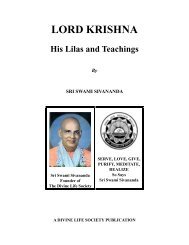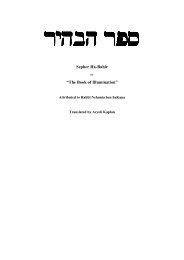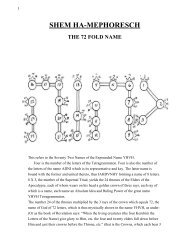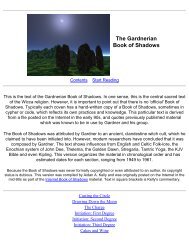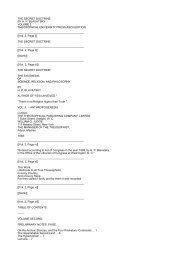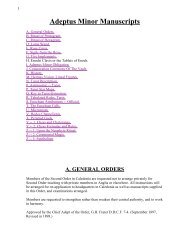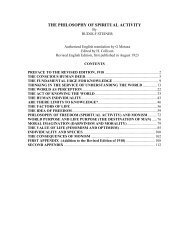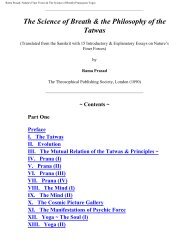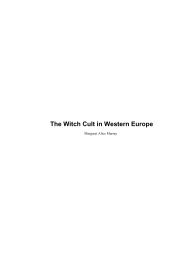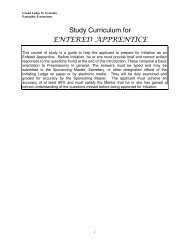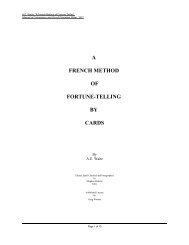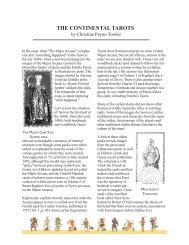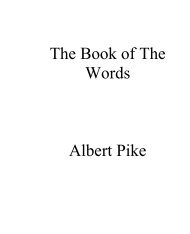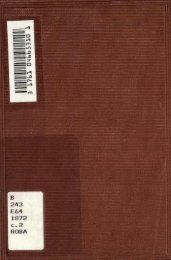Create successful ePaper yourself
Turn your PDF publications into a flip-book with our unique Google optimized e-Paper software.
Plates VII.-X.<br />
What <strong>the</strong>n is this? (21) It is Amentet, [that is to say] <strong>the</strong> creation <strong>of</strong> <strong>the</strong> souls <strong>of</strong> <strong>the</strong> gods when Osiris was<br />
leader in Set-Amentet; or (22) (as o<strong>the</strong>rs say), Amentet is that which Ra hath given unto me; when any<br />
god cometh, he doth arise and (23) doeth battle for it.<br />
"I know <strong>the</strong> god who dwelleth <strong>the</strong>rein."<br />
(24) Who <strong>the</strong>n is this? It is Osiris," or (as o<strong>the</strong>rs say), Ra is his name, even Ra (25) <strong>the</strong> self-created.<br />
"I am <strong>the</strong> bennu[1] bird (26) which is in Annu, and I am <strong>the</strong> keeper <strong>of</strong> <strong>the</strong> volume <strong>of</strong> <strong>the</strong> book <strong>of</strong><br />
things[2] which are and <strong>of</strong> things which shall be."<br />
Who (27) <strong>the</strong>n is this? It is Osiris, or (as o<strong>the</strong>rs say), It is his dead body, or (as o<strong>the</strong>rs say), (28) It is his<br />
filth. The things which are are and <strong>the</strong> things which shall be are his dead body; or (as o<strong>the</strong>rs say), (29)<br />
They are eternity and everlastingness. Eternity is <strong>the</strong> day, and everlastingness (30) is <strong>the</strong> night.<br />
"I am <strong>the</strong> god Amsu[3] in his coming-forth; may his (31) two plumes be set upon my head."<br />
[1. See above, p. 277, note 2.<br />
2. Or, "I am he that presideth over <strong>the</strong> arrangement (or ordering) <strong>of</strong> things," etc. Birch renders it, "The Creator <strong>of</strong> beings<br />
and existences," and Pierret, "La loi de 1'existence et des êtres." In a hymn Ra is called neb enti, "lord <strong>of</strong> things which are,"<br />
and ari enti, "maker <strong>of</strong> things which are," and ari unenet, "maker <strong>of</strong> things which shall be." See Grébaut, Hymne à<br />
Ammon-Ra, pp. 5, 16, 27, who, however, believes to mean inanimate objects; see p. 130.<br />
3. The name <strong>of</strong> this god was first read Khem, and <strong>the</strong>n Min, but it has been proved (Aeg. Zeitschriff, 1877, p. 98, and<br />
Trans. Soc. Bibl. Arch., Vol. VIII., p. 204, note 2) that <strong>the</strong> correct {footnote page 283} reading is Amsu (compare <strong>the</strong><br />
variants in Naville, Todtenbuch, Bd. II., Bl. 41). This god was associated with Amen-Ra, and represented <strong>the</strong> power <strong>of</strong><br />
reproduction (see Pierret, Panthéon, p. 39; and Lanzone, Dizionario, p. 935). The seat <strong>of</strong> his worship was Apu, <strong>the</strong><br />
Panopolis <strong>of</strong> <strong>the</strong> Greeks, and <strong>the</strong> Akhmîm <strong>of</strong> Arabic writers. For <strong>the</strong> forms <strong>of</strong> <strong>the</strong> name <strong>of</strong> <strong>the</strong> town, see Brugsch, Dict.<br />
Géog., p. 19. Figures <strong>of</strong> Amsu, in bronze and faïence, are common, and good examples are Nos. 43, 44, 45, 46, 47a, and<br />
13,520 in <strong>the</strong> Third Egyptian Room.]<br />
{p. 283}<br />
Who <strong>the</strong>n is this? Amsu is Horus, <strong>the</strong> (32) avenger <strong>of</strong> his fa<strong>the</strong>r, and his coming-forth is his birth. The<br />
(33) plumes upon his head are Isis and Nephthys when <strong>the</strong>y go forth to set <strong>the</strong>mselves (34) <strong>the</strong>re, even as<br />
his protectors,[1] and <strong>the</strong>y provide that which (35) his head lacketh,[2] or (as o<strong>the</strong>rs say), They are <strong>the</strong><br />
two exceeding great uræi which are upon <strong>the</strong> head <strong>of</strong> <strong>the</strong>ir (36) fa<strong>the</strong>r Tmu, or (as o<strong>the</strong>rs say), His two<br />
eyes are <strong>the</strong> two plumes.<br />
(37) "Osiris Ani, <strong>the</strong> scribe <strong>of</strong> all <strong>the</strong> holy <strong>of</strong>ferings, riseth up in his place in triumph; he cometh into (38)<br />
his city."[3]<br />
What <strong>the</strong>n is this? It is <strong>the</strong> horizon <strong>of</strong> his fa<strong>the</strong>r Tmu.<br />
(39) "1 have made an end <strong>of</strong> my shortcomings, and I have put away my faults."<br />
What <strong>the</strong>n (40) is this? It is <strong>the</strong> cutting <strong>of</strong>f <strong>of</strong> <strong>the</strong> corruptible[4] in <strong>the</strong> body <strong>of</strong> Osiris, <strong>the</strong> scribe Ani, (41)<br />
triumphant before all <strong>the</strong> gods; and all his faults are driven out.<br />
(42) What <strong>the</strong>n is this? It is <strong>the</strong> purification [<strong>of</strong> Osiris] on <strong>the</strong> day <strong>of</strong> his birth.<br />
(43) "I am purified in my exceeding great double nest[5] which is in Suten henen, (44) on <strong>the</strong> day <strong>of</strong> <strong>the</strong><br />
<strong>of</strong>ferings <strong>of</strong> <strong>the</strong> followers <strong>of</strong> <strong>the</strong> great god who is <strong>the</strong>rein."<br />
http://www.sacred-texts.com/egy/ebod/ebod18.htm (7 <strong>of</strong> 14) [8/10/2001 11:27:39 AM]



